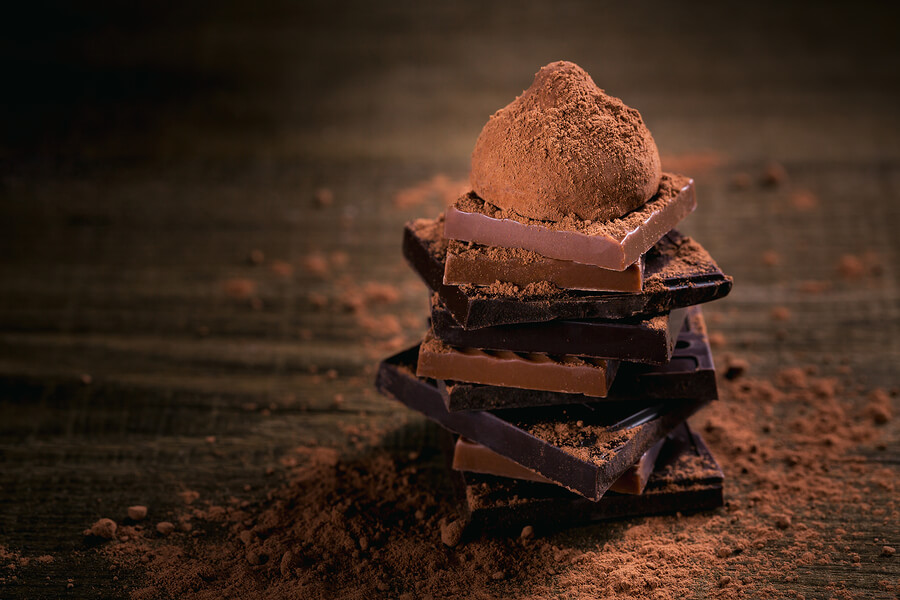Foods to Avoid During Lactation
There's an idea that there are foods that should be avoided during breastfeeding. But what's true and what isn't? Find out here.

Because they want to provide as much well-being as possible to their baby from the very first moment, many mothers wonder if there are any foods to avoid during lactation to prevent their milk from being “contaminated”. Have you ever asked yourself this question? If so, be sure to read everything we’re going to tell you below.
Breast milk is, par excellence, the best food that can be provided to a newborn. However, can it really be altered if the mother consumes certain foods and beverages? What’s the case with fish? What’s true and what’s not true regarding this subject? Let’s take a closer look below.
What do you need to know about eating during breastfeeding?
First of all, there’s a crucial point to remember in all this: The composition of breast milk isn’t as easily altered as is often believed. The mother’s diet affects only a few nutrients, according to a study published in the journal Anales de Pediatría.
“The content of carbohydrates, protein, calcium and iron doesn’t change much even if the mother ingests little of these in her diet. However, if a mother’s diet is deficient in water-soluble vitamins and vitamins A and D, her milk contains less of these nutrients.”

Priya Tew, mother, dietitian, and member of the British Dietetic Association and the Health Professionals Council says that, except for oily fish, there’s no list of foods to avoid during lactation.
Certain species of oily fish should be avoided during pregnancy and lactation because of their mercury content.
The expert also comments that there’s no need for a special diet during breastfeeding, but rather a balanced diet, according to the mother’s needs from a nutritional point of view. Of course, if the mother’s allergic to any type of food, she should avoid it, but for her own health.
Some of her most important recommendations for breastfeeding mothers are the following:
- Maintain adequate hydration (prioritize the consumption of water over any other beverage, even homemade juices).
- Avoid drinking more than 3-4 cups of coffee a day.
- Although it’s best to avoid it completely, mothers can drink alcohol occasionally. In any case, there’s no amount of alcohol in breast milk that’s considered safe for the baby. For this reason, and according to the recommendations of the Spanish Association of Pediatrics, breastfeeding shouldn’t take place until 3 hours after having consumed any alcoholic beverage.
- It’s not a good idea to go on any kind of weight loss diet while breastfeeding. It’s essential to get good advice from your doctor and nutritionist and follow their instructions to achieve your goals without putting your health and that of your child at risk.
- Although it’s tempting to take more care of your baby’s diet than your own, you shouldn’t neglect yourself. Eating a balanced diet helps you stay healthy and active, which is essential at any stage.
What foods to avoid during lactation
As with many other topics, there are many myths about what should and shouldn’t be consumed during breastfeeding. Most of them are based on a lack of knowledge about nutrition and health, as well as popular beliefs that science doesn’t support.

Some of the most common myths are the following:
- Caffeine sources (such as coffee, tea, chocolate, and cola) shouldn’t be consumed because “they can affect the baby’s health”. Of course, the truth is that consumption should be moderate because excessive amounts could be harmful and cause agitation or sleep problems.
- Foods that cause flatulence (such as legumes) shouldn’t be consumed because “it will cause colic in the baby”.
- The consumption of very spicy or spicy foods “can alter the breast milk and irritate the baby’s stomach”. These should only be removed from the maternal diet if intolerance or rejection is observed.
- The mother shouldn’t consume chocolate because it contains theobromine which “can cause diarrhea in the baby and can also affect the baby’s nervous system and cause nervousness and irritability”.
- The consumption of sweets and candies should be avoided “because it could promote restlessness in the child and make it difficult for them to listen and fall asleep”.
- Fast food and ultra-processed food should be avoided because “they contain too many chemicals that can contaminate the mother’s and baby’s body”. However, these types of products aren’t recommended in a healthy diet for the entire population in general. They’re poor in vitamins, minerals, and fiber, key nutrients for a good state of health of the mother and for optimal milk production.
There’s no scientific evidence that the above-mentioned foods have a real impact on the baby’s health during breastfeeding.
Therefore, first of all, common sense must be maintained: Any excess can harm a woman’s health and interfere (to a greater or lesser extent) with the baby’s feeding.
For example, excessive caffeine consumption can cause the mother to overdose and this can prevent her from being willing to breastfeed her child. As the experts at MedlinePlus explain: “a short hospital stay may be needed to complete treatment for caffeine overdose”.
So, what foods should be avoided during breastfeeding?
The Science News and Information Service indicates that there’s still a lot of research and clarification to be done by the scientific community on what to avoid and why. However, it recommends completely avoiding the consumption of drugs in general: Tobacco, alcohol, and narcotics, as these substances could have different consequences for the baby’s health.
Discover: Myths and Doubts About Breastfeeding
It’s also not advisable to take medicinal plants, plant supplements, or any other kind of supplements. Some of the active ingredients could be harmful. In any case, if you have any doubts, you can consult a health professional.
Final thoughts on foods to avoid while breastfeeding
If you’re about to become a mother (or have recently become one), don’t be anxious. Tell your doctor all your concerns and the professional will help you clear them up and help you know how you should eat during breastfeeding so that you can be healthy and self-confident when taking care of your baby.
If at any time you have doubts about a specific aspect, don’t keep the doubt to yourself and tell the professional. This way, you won’t only know what to do and what not to do, but you’ll also be more confident when it comes to organizing your meals on a daily basis. Remember, no question is silly when it comes to your or your baby’s health.
